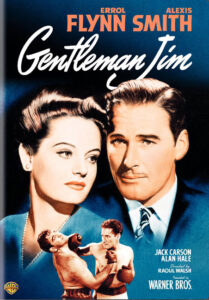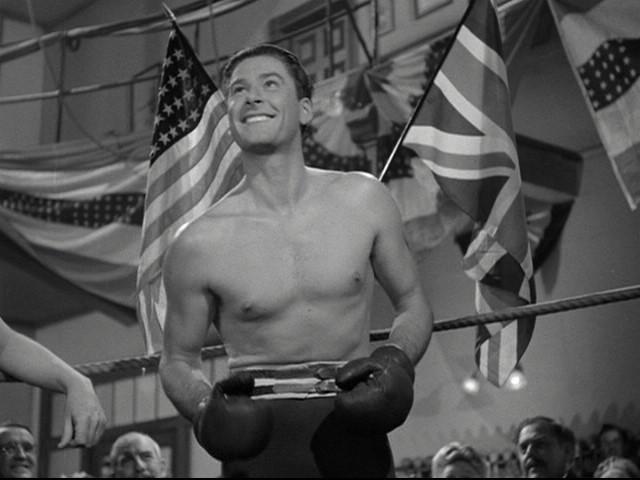“The Corbetts are at it again!”
|

Synopsis:
In 19th century San Francisco, Irish-American bank teller Jim Corbett (Errol Flynn) rises to fame and becomes renowned boxer “Gentleman Jim”.
|
|
Genres, Themes, Actors, and Directors:
- Alan Hale Films
- Alexis Smith Films
- Biopics
- Boxing
- Errol Flynn Films
- Jack Carson Films
- Raoul Walsh Films
- Social Climbers
- Ward Bond Films
Response to Peary’s Review:
Along with many other critics, Peary is clearly a fan of this “thoroughly enjoyable, if highly fictionalized bio of… the first modern (scientific) heavy-weight boxing champion”, Gentleman Jim Corbett. As boxing movies go, Gentleman Jim is remarkably tame: Corbett is never forced to throw a fight (like John Garfield in 1947’s Body and Soul), nor does he become an insufferable heel after finding fame (like Kirk Douglas in 1949’s Champion). The closest this light-hearted film ever comes to genuine pathos is during its final “wonderful scene”, in which “the suddenly humble Corbett confesses to the prideful Boston Strongboy, in front of all the people at his own victory party, that he’s thankful he didn’t fight [him] when [he] was in his unbeatable prime”. Corbett is indeed “an ideal role” for handsome Errol Flynn, and director Raoul Walsh keeps things moving at an engaging clip; but Gentleman Jim is really only must-see viewing for fans of boxing flicks and/or Errol Flynn.
Redeeming Qualities and Moments:
- Errol Flynn as “Gentleman Jim” Corbett

- Several enjoyable boxing sequences
Must See?
No, but it’s certainly recommended.
Links:
|
One thought on “Gentleman Jim (1942)”
Although there are several reasons I’m tempted to think of this as a must, it probably is ultimately for fans of boxing and/or Flynn.
Even with Alexis Smith’s (fictional?) character on the sidelines, this is your basic ‘guy movie’. If, as a biopic, it exaggerates the truth (although it does seem to follow closely enough to what’s written in the Wikipedia entry), at least the film isn’t saddled with some by-the-numbers, sappy love angle throwing the main story off-balance. (There is that little bit of love stuff at the end, but it didn’t actually ring all that true to me – but, again, at least it’s at the end. …To that I should add that I do like the well-written scene between them, in which she flatly refuses to make herself available for a date.)
I’d guess Scorsese absorbed this one while preparing ‘Raging Bull’. Director Walsh does a terrific job overall, but esp. with the boxing matches – and with large crowds surrounding them. (I wonder if some of that credit goes to co-writer Horace McCoy – who also wrote the novel ‘They Shoot Horses, Don’t They?’ He seemed to know how to capture the crowd spirit. In fact, I like one of the earliest matches in the film, during which the crowd isn’t just standing outside the ring – but moving along the sides of it, as a group, to keep up close with the action. That seems authentic observation.)
For the most part, this really is Flynn’s movie; he seems to have thrown himself into a part he enjoyed playing. But he does get some stiff competition from an excellent Ward Bond as John L. Sullivan: their backstage scene, in which Flynn cleverly gets Bond all riled up, is possibly my favorite in the film – followed by their genuinely touching scene (for boxers!) near the end.